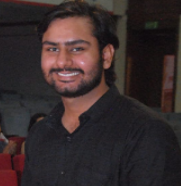
DIPS ACADEMY has truly been one of the most profound learning experience where I gained the confidence to move ahead in my carrer with the opportunity to put myself on the forefront in dealing mathematics. DIPS programme is very well designed with very helpful test series. Dubey Sir and other faculty are superb. The lectures of Dubey Sir are the most intersting and inspiring.

I am very contented with the dips family specially dubey sir, he's an excellent mentor with amazing teaching skills.The mathematical atmosphere along with one to one interaction, dips material and doubt clearing sessions provided by DIPS ACADEMY were very helpful throughout the journey.

" The guidance of Dubey Sir, a teacher with immense knowledge and wonderful teaching skills, was of great help for me. His approach towards tackling problems, in particular, is pecular and worth emulating I thank him for his invaluable guidance and continuous motivation. "

I'm Mamta Kumari and I secured AIR 47 in IIT - JAM Mathematics. I am very thankful to Dubey Sir, Amit Sir and all the other faculty members for their teachings and guidance. The classes used to be very interactive and environment was very positive for learning. I have learned a lot from Dips academy and I'm very thankful to all the faculties for teaching us the actual meaning of Mathematics in the best possible way.


Now a day's most of the exams are being conducted online and students are bound to appear in these exams like GATE and JAM only. We at dips academy are having one of the best online test platforms in India. We use online test application not only to provide the real experience of actual exams but also to give our students the best possible analysis and assessment of their tests.
All the regular students of dips academy are provided their ID and password. Using these credential students not only take online tests, but also get a comprehensive analysis of even those tests which are taken in the classroom on OMR sheets.
Students from all over India can avail our online test facilities. Buying the test package of their requirements, students can not only assess their preparation, but also check their all India rank. Moreover, all the data of classroom tests of the regular students is merged with online test data. So if you are taking online test series from dips academy you can always test your standing with the academy's regular and serious candidates.
International quality of questions.
The question papers are designed as per the actual importance of the topic in the real scenario.
The questions available on even every minute concept. Practicing such question will provide you the understanding of the concept.
Full length, Topic Wise and concept wise tests available.
3600 Analysis of your performance.
Get Answer and solution post test
Similar test screen to actual exam pattern
Flexible to attempt anytime anywhere,just a click away.

(Online Test Series)
7 Test (4 Module Wise + 3 Full Length)
Rs. 549 /- (+ GST)
GATE MATH TEST SERIES SCHEDULE 2026 (ONLINE) |
||||||
|
TEST TYPE |
Modules |
DATE |
Syllabus |
|||
|
MWT-01 |
Real Analysis + Topology + Functional + Metric Space |
03-Jan-26 |
Complete syllabus of given modules. |
|||
|
MWT-02 |
ODE + PDE + Numerical Analysis |
07-Jan-26 |
Complete syllabus of given modules. |
|||
|
MWT-03 |
Complex Analysis + Group theory + Ring Theory +Linear Agebra |
11-Jan-26 |
Complete syllabus of given modules. |
|||
|
MWT-04 |
Integral Calculus + Vector Calculus + LPP |
15-Jan-26 |
Complete syllabus of given modules. |
|||
|
FLT-01 |
Full Length Test |
19-Jan-26 |
As per Exam Pattern |
|||
|
FLT-02 |
Full Length Test |
24-Jan-26 |
As per Exam Pattern |
|||
|
FLT-03 |
Full Length Test |
29-Jan-26 |
As per Exam Pattern |
|||
> Total Questions: 40 (Each MWT) & 55 (Each FLT)
> Total Marks: 65 (Each MWT) & 85 (Each FLT)
> Total Duration: 120 Minutes (Each MWT) & 180 Minutes (Each FLT)

DIPS ACADEMY has truly been one of the most profound learning experience where I gained the confidence to move ahead in my carrer with the opportunity to put myself on the forefront in dealing mathematics. DIPS programme is very well designed with very helpful test series. Dubey Sir and other faculty are superb. The lectures of Dubey Sir are the most intersting and inspiring.

I am very contented with the dips family specially dubey sir, he's an excellent mentor with amazing teaching skills.The mathematical atmosphere along with one to one interaction, dips material and doubt clearing sessions provided by DIPS ACADEMY were very helpful throughout the journey.

" The guidance of Dubey Sir, a teacher with immense knowledge and wonderful teaching skills, was of great help for me. His approach towards tackling problems, in particular, is pecular and worth emulating I thank him for his invaluable guidance and continuous motivation. "

I'm Mamta Kumari and I secured AIR 47 in IIT - JAM Mathematics. I am very thankful to Dubey Sir, Amit Sir and all the other faculty members for their teachings and guidance. The classes used to be very interactive and environment was very positive for learning. I have learned a lot from Dips academy and I'm very thankful to all the faculties for teaching us the actual meaning of Mathematics in the best possible way.
